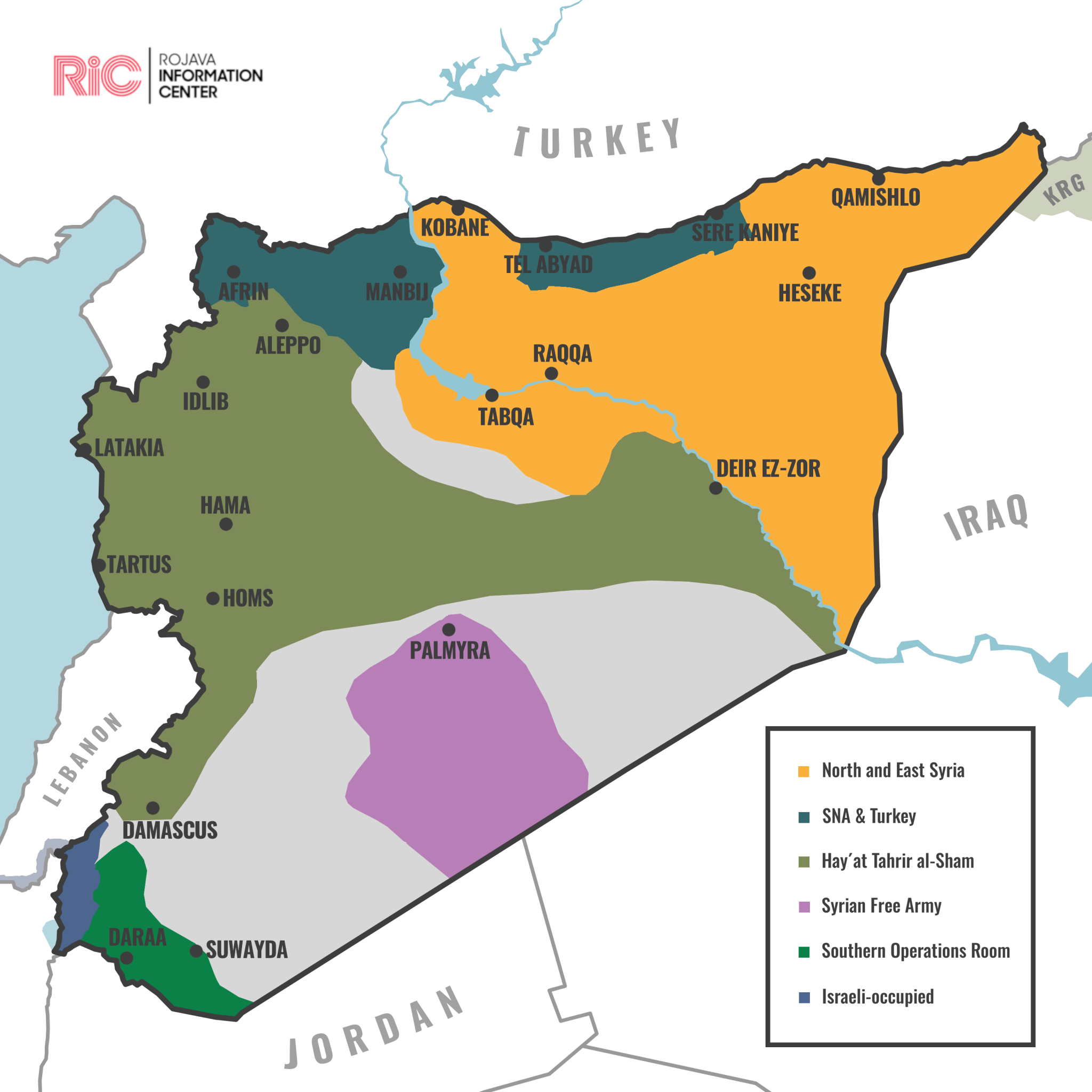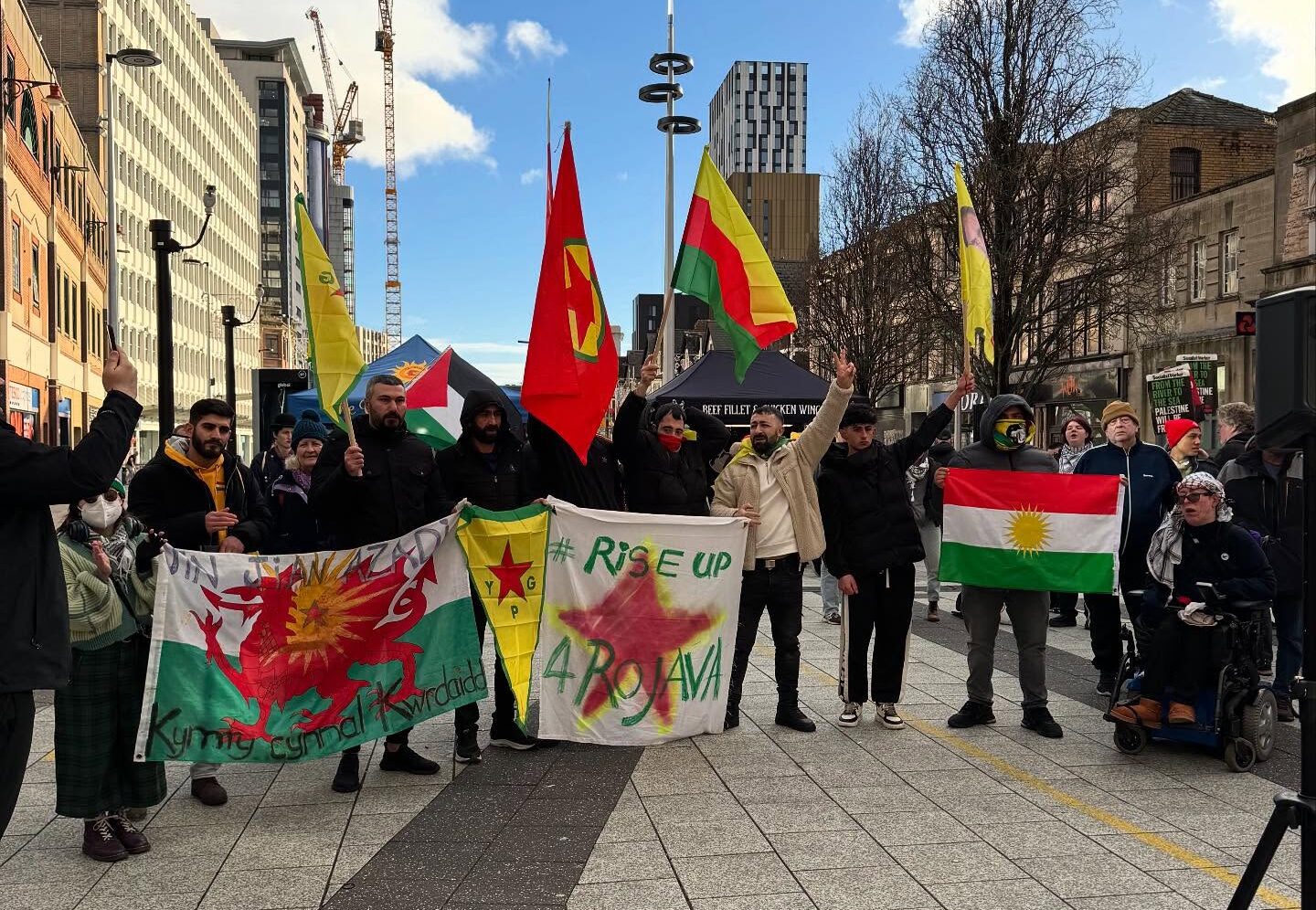Things continue to develop rapidly on the ground in Syria; we are firmly in the midst of ‘weeks in which decades happen’. At the same time, the British state continues to ratchet up its repression of its Kurdish communities in an unprecedented manner. We do not, for a moment, believe these two threads are unrelated.
It’s clear that Rojava, and the Rojava revolution, are in peril. But they have been in peril since the day they declared themselves to the world, just over 12 years ago. It is impossible to issue so strong a challenge to the dominant system as Rojava does, and not to face violent retaliation. Rojava stands as a shining example of the possibilities that come with resistance. The people of North and East Syria routed ISIS, when all others had failed to do so. They came to the aid of the Yazidis, and taught them how to organise themselves into self-defence forces to ensure that they would never again be at the mercy of others. They have survived Turkish invasions, jihadi terror cells, natural disasters, and so much more, and they continue to show us that there still exists an alternative way of life; one based on shared values of democracy, women’s autonomy and ecology.
So, once again, join us as we attempt to summarise what has happened in the past week. Share this update and the linked stories to help spread the word about Rojava, and (if you have the means to do so) consider supporting one of the campaigns linked below.
See previous weekly summaries here. You can also follow us on social media, and sign up to our email mailing list, by visiting the Contact Us page. If you have any comments, suggestions or stories for these summaries, email us at media@kurdistansolidarity.net.
Crisis in Syria

- On Dec 11, a US-brokered ceasefire was declared between the Turkish-backed coalition of jihadi groups and criminal gangs known as the ‘Syrian National Army’ (SNA) and the Syrian Democratic Forces (SDF), the armed forces of the Democratic Autonomous Administration of North and East Syria (DAANES, a.k.a. Rojava).
- Despite the ceasefire, there remained ongoing reports of SNA violence and atrocities in the areas under its control, particularly targeting members of the DAANES administration. On Dec 15, the SDF announced that the ceasefire had collapsed due to ongoing Turkish/SNA aggression.
- The Turkish military and SNA proxies continue to attack the city of Kobani (a.k.a. Kobanê), though the SNA have been unable to make it across the Euphrates via the Qarah Qawzaq (a.k.a. Qereqozax) bridge. Damage has been reported to the Tishreen Dam following Turkish/SNA strikes, risking ‘flooding, loss of life, damage to agricultural land […and] loss of electricity to large segments of Northeast Syria’.
- The SDF have returned the oil-rich city of Deir ez-Zor captured last week to the HTS-led ‘Salvation Government’ and withdrawn their forces.
- A shooting in Raqqa left over 40 people injured. The SDF have released footage of a man with a light machine gun firing in the midst of a crowd, but Turkish misinformation operations have been claiming that the SDF fired on a group of protesters. Meanwhile, the people of Manbij (under Turkish/SNA control) have declared a general strike.
- A Permanent Peoples’ Tribunal has been announced to ‘address allegations of severe human rights violations and war crimes committed by the Turkish government and Turkey-backed forces in north and east Syria, also known as Rojava.’ The Tribunal will take place in Brussels in February, and the organisers have issued a call for interested journalists to register to attend.
- Since Dec 12, the new post-independence Syrian flag has been flying at DAANES institutions, signifying the administration’s desire for national unity.
- Saturday (Dec 17) saw a global day of action for Rojava, co-ordinated by the #RiseUp4Rojava campaign. KSN issued a statement to mark the day, calling on all democratic, grassroots and antifascist forces to resist.
- The DAANES maintains its worldwide call for reporters to visit North and East Syria to report on the situation there.
- Heyva Sor a Kurdistanê are continuing to fundraise to enable them to support the huge numbers of internally displaced people (IDPs) within Rojava. Another campaign seeking donations is Solardarity, which aims to replace destroyed generators and oil refineries with solar energy.
Repression in the UK

- The six Kurdish activists arrested on November 27 have been charged with membership of the Kurdistan Workers’ Party (PKK), a proscribed group under the Terrorism Act. Five have been released on parole, whilst the remainder has been remanded to prison until the trial, which may not start for a year.
- These prosecutions are, as far as we can tell, a first for the British state, which has until now focussed on other charges such as financing or displaying images of a proscribed group (including several prosecutions that were dropped or failed, displaying that they are primarily used as a tool of repression). The maximum potential sentence is 14 years, though we are cautiously optimistic given the past success rate of similar attempts.
- The Kurdish Assembly (the key body that represents the Kurdish community across Britain) has launched the Hands Off Kurds campaign, beginning with a detailed report about the police attacks from last week.
- Solidarity events have been held this week in Cardiff, Liverpool, London, Manchester, Sheffield, as well as cities across Europe and Turkey. The petition against the British state’s persecution of Kurds has reached almost 9,000 signatures.
- In the midst of Heyva Sor’s ongoing campaign to raise much-needed funds to supply the rapidly-growing numbers of internally displaced people (IDPs) in Rojava as winter sets in, the British state has frozen the bank account of their UK branch for six months. Make no mistake, this is a calculated part of the wider campaign to criminalise Kurdish communities in Britain, and this denial of vital humanitarian aid will kill people.
- The Manchester Coroner’s Court, investigating the death of internationalist Dan Burke in Ukraine last year, has ruled that he was murdered by a supposed comrade: an Australian known as ‘Jihadi Adam’. The motive is unclear, though we would be unsurprised to learn of a link to Burke’s previous time fighting with the YPG against ISIS. Dan Burke was also subjected to a punitive prosecution for his heroic actions in Rojava upon return to Britain, though this was later dropped; as we see elsewhere, for the British state winning a conviction is hardly the point.